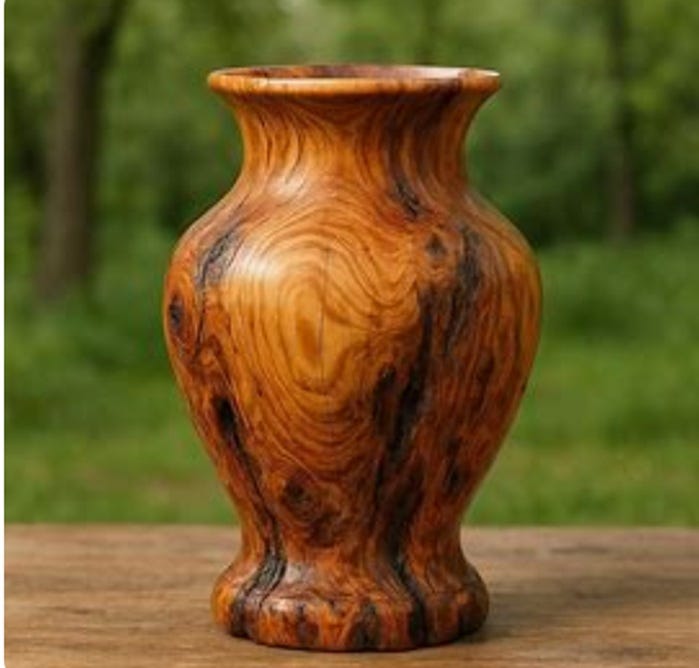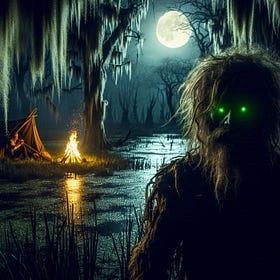THE KANAKA
#136 - “Yes, I am from Hawaii. I first got to San Francisco on a trading ship. It was my third trip here. I was eighteen."
Welcome to Before I Forget . .
I’m glad you are here. Thank you for your time.
THE KANAKA
It was 1919.
I drove out from Berkeley Hills to Walnut Grove in my new Chandler. There’s a ferry along the way.
I was at Kanaka’s Wood Garden to pick up a gift for my wife.
I wanted a vase carved from an old stump I dug up when clearing our land. We were just married. I told her I was going to do it one day. That was 1869.
That old stump stayed in the barn, out of the elements, all these years.
“Kanaka,” is a well-known Woodsmith in the area. His work is featured in the local culture mags and a few nationals.
I thought the vase was beautiful. I knew my wife would love it.
We moseyed around his open-air shop talking about things he was working on. All were custom made for his clients. Like furniture, and tables and such. Lumbered materials for construction and carpentry. Refurbishing or created new.
Kanaka offered me a seat near an old pot-belly stove.
Within a few feet, coal embers kept the fall chill at bay. The view looked out on the just harvested walnut groves. The house and shop were all but engulfed in the trees.
A stiff wind, before a coming rain, blew leaves from the trees. The rain would bring down more.
“How did you get here?” I asked him. “How did it happen that a fellow from Hawaii, set up shop in a walnut grove just across the river from the small town appropriately named, Walnut Grove?”
He said, “Well, Walnut Grove didn’t exist then. Most of the area was a concentration of Chinese railroad workers and miners, and farmers. It became Locke, and Walnut Grove grew up next to it after 1900 or so.
“Yes, I am from Hawaii. I first got to San Francisco on a trading ship. It was my third trip here. I was eighteen.
“We heard, along with the everybody else, that gold had been discovered in the mountains east of San Francisco. The city was jammed with men from all over. Each one headed for the gold. We should have brought shovels and picks instead of pineapples.
“I wanted to join them.
“Other crew members felt the same, but it wasn’t the thing to do, we thought.
“But the captain and first mate took off. They said, ‘they were going to do business,’ and never returned.
“Two days later, we remaining Kanaka took off as well.
In the Hawaiian language, ‘Kanaka’ refers to a human being, but here, we were foreigners and the name took on a negative slant. All of us were ‘Kanaka’.
“We weren’t the first. Hundreds of crews took off. Empty ships plugged up the harbor. It was the gold fever.
“My given name is ‘Kai.’ I had no last name. It only became required to have a last name in Hawaii in 1860. I took on our family tribal name of ‘Aka’ after that.
“But over time, ‘Kanaka’ grew on me.
“Did you head for the gold fields then?” I asked.
“We did. We bought supplies and a ticket on a paddle-wheeler up the Sacramento River past Sacramento to Yuba City. Then, we didn’t know what we’d do.
“The first afternoon out, after exiting the bay and entering the Carquinez Strait and River proper, the ship stopped for fuel at a place called Port Costa. We had a brief lay-over while getting more coal. We headed for the saloon.
“After a couple beers and going back to the steamer, I was robbed. I was such a fool. It was a set up. A fellow asked me for help loading a table onto his wagon. I didn’t understand his English, but I could see what he was gesturing. I set down my gear to help him.
A little distance separated me from my friends. I took my eyes off my stuff but for a moment, and another fellow grabbed it and ran.
“I chased after him and caught him. We were throwing fists and kicking and wrestling on the ground. I had the upper hand, I thought, but he slipped one in and clocked me on the chin.
“I hit the ground. Not out but stunned a few seconds. And he and my stuff was gone, disappearing among people, horses, wagons, and narrow alleyways.
“But he left something. A bundle fell from his coat. It was a gun and belt.
“My friends came to my aid, but it happened so fast, they were late. Passers-by just minded their own business.
“The gun, I learned later, was a Colt 1851 Navy Revolver.
“I had never fired a gun. I learned, and it proved handy.
“I had what I had on me, my money, and a gun.
“I still have it, up on the mantle over the fireplace. I fire it on New Year’s Day. It’s a ball and cap muzzle-loader. It’s a beauty. I’ll show you on the way out.
“From Yuba City, most of us were on foot. So many men looking for riches.
“When we got to the foothills, people were splitting up and making their own way on Indian and animal trails, up the rivers and valleys, panning for gold.
“We moved up what was part of the middle fork of the Yuba River near the small settlement of Allegheny.
“The seven of us laid claim on a stretch of tributary creek downslope and southwest of town, maybe a mile plus as the crow flies.
“It was a very good spot. Other miners took note and pressure mounted on us to move on.
“One fellow. A French man named ‘Jac’ had taken a real liking to our stretch of creek and had a real disliking for me. I don’t think he liked my smile. He was big and ugly, and mean.
“In two years at the creek, only I was left. Two of us just disappeared. Jac and his gang had scared us away. I only saw one of my friends again.
“One night at the saloon in Allegheny, that belligerent cuss caught me making eyes at the bar gal he had eyes for. Which was true, she was making eyes at me. He went off. Maybe he saw it as an opportunity to settle things, as it were.
“He took a swing at me, which I dodged, almost. His punch hit deep into my shoulder. I feel it to this day.
“I countered with a shove that sent him sprawling onto a table of card players and I bolted for the exit.
“He chased me down the rutted road, my shoulder numb and my Colt drawn. He fired a couple rounds and I thought about returning fire, but I reached the trail for camp and plunged into the complete dark of the forest.
“It was twenty minutes to my camp, if you knew the shortcut. Fifteen more, along the usual trail. Both trails were steep, with drop-offs and climb-over size rock.
“Jac knew the trail well enough. I figured he was drunk enough. He’d be coming for me.”
“I had some time on him.”
Part 2 next time
Thank you for reading Before I Forget . . !
For my new Subscribers - a post from Oct. 25, 2024,
It's The Rougarou
#110 -They steal up on you at night, and all they have to do is touch you and you become one of them, and then it’s too late. You have to pass it on to someone else.
Image by GPT-4o








We need to remember WHO WE ARE & WHO WE WERE. I found out that I have some percentage of Turkish ancestry ( maybe Ottoman ), but you wouldn't know it if you saw me. Cherokee, yes.
Those times were very different. Or, maybe not.